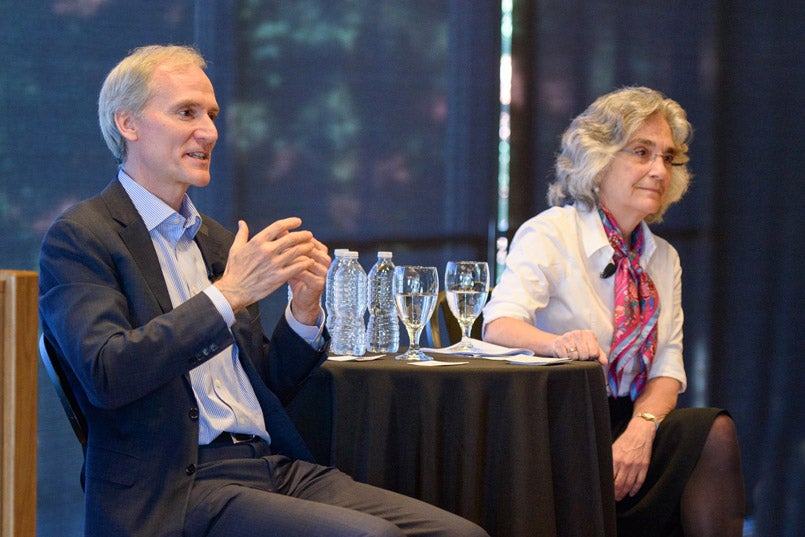October 17, 2017
Four stories of alumni contribution
I was honored last Friday to participate in one of the highlights of Reunion Homecoming weekend – the induction ceremony for the Multicultural Alumni Hall of Fame.
A spirited crowd of alumni filled the Oak Room of Tresidder Union for the ceremony. The Multicultural Alumni Hall of Fame was established in 1995 at the suggestion of former Trustee Charles Ogletree, former Vice Provost Mary Edmonds and the directors of our four ethnic community centers. The ceremony honors alumni who have made exceptional contributions to the world.
This year’s four inductees told moving stories of their Stanford experiences and of their work in the wider world. Each was selected through a process involving faculty, students, staff and alumni affiliated with one of the community centers.
I thought others would be as inspired as I was to learn more about them:
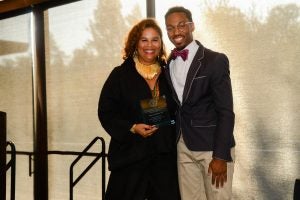
Yvette Lee Bowser, ’87, was the inductee from the Black Community Services Center. She is a television writer and producer who started her career as a writer for the television show A Different World and in the years since has produced hit series including Living Single, Half & Half and this year’s Dear White People.
In her acceptance remarks, Yvette talked about how she forged her identity at Stanford and learned at Stanford to trust her voice – and how people she met here provided inspiration for some of her future characters! Hers was a compelling story of how seeing African-American representation in the media challenged her to go out and change it. “Stanford taught me to question authority, to question everything around me, and to question it again,” she said.
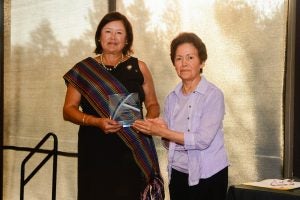
Delia Casillas, ’74, was the inductee from El Centro Chicano y Latino. She spoke of her time on campus in the exciting and turbulent early 1970s, how important it was to her to find a sense of belonging, and the shaping of her mission to fight for social justice and equity. Her story is one of advocacy and mentorship, from being a student leader in MEChA, to becoming an educator and community advocate in the Bay Area, to founding the Stanford Chicano/Latino Alumni Association.
Delia also called on the university to continue to recruit from the communities represented in the Multicultural Alumni Hall of Fame, to ensure that students see themselves in the faculty and staff at Stanford, and to support the community centers.
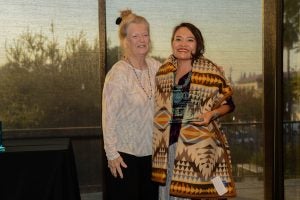
Karletta Chief, ’98, MS ’00, was the inductee from the Native American Cultural Center. She didn’t find Stanford, she said – through the help of a high school counselor, Stanford found her, in a remote Navajo community where her home did not have electricity or running water.
Stanford, she said, was “the hardest time of my life and also the best time of my life.” The cultural adjustment to Stanford was tough – but those she found in the Native American community here provided crucial support. Having seen the impacts of mining in her home community, she earned degrees in civil and environmental engineering at Stanford, wanting to use them to go back and help her people. She went on to earn a Ph.D. in hydrology and water resources at the University of Arizona, where today she is an assistant professor and extension specialist.
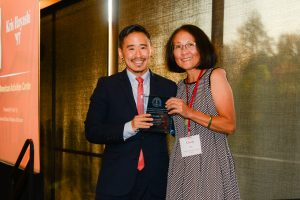
Finally, Kris Hayashi, ’97, was the inductee from the Asian American Activities Center. He is executive director of the Transgender Law Center, a national nonprofit advocacy organization. Kris was described by A³C’s Cindy Ng as a humble leader who can work effectively with philanthropic donors one day and staff a registration table the next!
Kris was involved in public service and in advocacy for ethnic studies as a Stanford student, and he talked about how he learned at Stanford a sense of history and of movements. He has been active in organizing throughout his 20-year career, and he spoke movingly of the struggles faced by trans and gender non-conforming people in our world today. “We all deserve to live safely, freely and as our true selves,” he said.
We celebrate the accomplishments of each of these inductees, and we are grateful to them for sharing with us what it means to realize one of Stanford’s deepest values of putting education to active work in the world for a greater good. Each person’s story also reminded me that we have more work yet to do in creating a fully inclusive community at Stanford. In my own short remarks, I asked the audience for its help and support in that endeavor.
